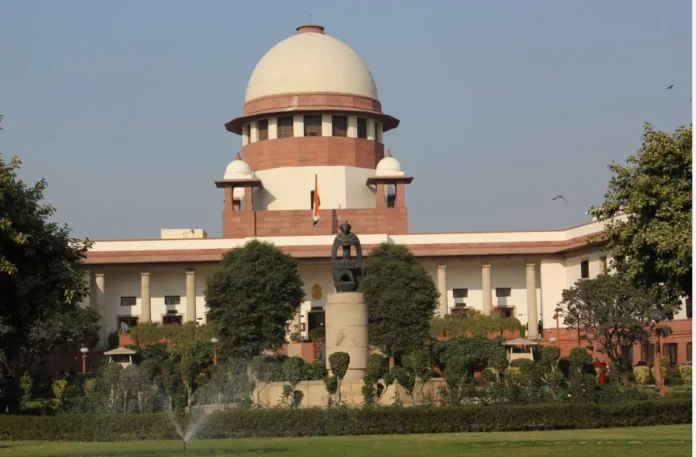The Supreme Court on Friday granted bail to former West Bengal Education Minister Partha Chatterjee in a money laundering case filed by the Directorate of Enforcement (ED) related to the teacher recruitment scam in the state.
The Bench of Justice Surya Kant and Justice Ujjal Bhuyan recorded in its order that the MLA could be released on bail on or before February 1, 2025.
It directed the trial court to decide on framing of charges before the commencement of winter vacations or before December 31, 2024, whichever was earlier.
The Apex Court observed that though the materials suggested the existence of a prima facie case against the petitioner, it was granting relief to Chatterjee on the grounds of well-settled principles that undertrial incarceration should not amount to punitive detention and that a suspect could not be kept in custody indefinitely.
The Bench further directed the trial court to record the statements of prosecution witnesses, who were most vulnerable in the second or third week of January 2025.
It said following the completion of these steps, Chatterjee could be released on bail. In any case, he could not be kept in custody beyond February 1, 2025.
The Bench also granted liberty to Chatterjee to challenge any adverse order passed regarding the framing of charges, adding that no stay should be granted on any such challenge.
Both the accused and the prosecution were directed to extend full cooperation for the trial.
The top court of the country said that Chatterjee, after being released on bail, should not be appointed in any public office. He could continue his work as an MLA during the pendency of trial in the ED case, it added.
The former West Bengal Minister is also under custody in a case registered by the Central Bureau of Investigation (CBI) arising out of the predicate offence.
Chatterjee moved the Apex Court challenging the Calcutta High Court order, which denied him bail in the money laundering case related to the alleged illegal recruitment of Assistant Teachers under the West Bengal Board of Primary Education.
The Apex Court had earlier expressed concerns over keeping an accused under custody for a long period without trial and flagged the low conviction rates in the cases prosecuted by ED.
On December 4, the Bench had reserved its orders in the matter. Appearing for ED, Additional Solicitor General SV Raju had laid great emphasis on Chatterjee’s role, distinguishing him from other accused.
Representing Chatterjee, Senior Advocate Mukul Rohatgi contended that all co-accused in the case had obtained bail and Chatterjee had been in custody for about 2.5 years.
The Bench remarked that on the face of it, Chatterjee was a corrupt person. Besides, the co-accused were not Ministers.
Rohatgi submitted that no recovery had been made from Chatterjee,
The Apex Court then said that as a Minister, Chatterjee would have “obviously” not kept money with him.
Rohatgi then contended that the petitioner had already spent two years and two months in jail in a case where the maximum punishment for money laundering under Section 4 of the Prevention of Money Laundering Act (PMLA) was seven years.
On April 30, the Calcutta High Court denied bail to the Trinamool Congress leader on the grounds that a prima facie case was established against him under PMLA.
ED had filed a case against Chatterjee in June 2022 soon after the Central Bureau of Investigation (CBI) began investigation into the alleged teacher recruitment scam, wherein eligible and meritorious candidates were denied jobs as school teachers, while ineligible persons, including failed candidates, got appointed by paying huge bribes.
The role of AITC leaders and office bearers of the West Bengal Board of Primary Education also came under scanner during investigations into the illegal selection of assistant teachers.
Searches were conducted, which led to the recovery of Rs 49 crore cash and jewellery worth Rs 5 crore from two flats of one Arpita Mukherjee, apart from incriminating documents. It was later known that Arpita was closely associated with Chatterjee. The documents revealed that the duo jointly operated bank accounts and dummy companies to conceal the proceeds of crime.
The agency further recovered digital devices from Chatterjee’s residence pointing to his illegal appointment of teachers.
While denying bail to Chatterjee, the High Court took into account the statement of witnesses that established the material against the accused and also linked him with Arpita Mukherjee.
Chatterjee initially chose to distance himself from the cash recovered from Arpita’s residence, however, ED showed the trust, faith and confidence in their dealings as Chatterjee was the nominee in the bank account and insurance policies belonging to Arpita.
The single-judge Bench of Justice Tirthankar Ghosh of the High Court held that the cash seizures and jewellery from the two flats did not at this stage create any circumstance in favour of the petitioner to overcome the twin conditions under Section 45 of PMLA.
The twin-condition test under Section 45 required the court to be satisfied that there were reasonable grounds for believing that the accused was not guilty of an offence and that he was not likely to commit any offence while on bail, it added.


